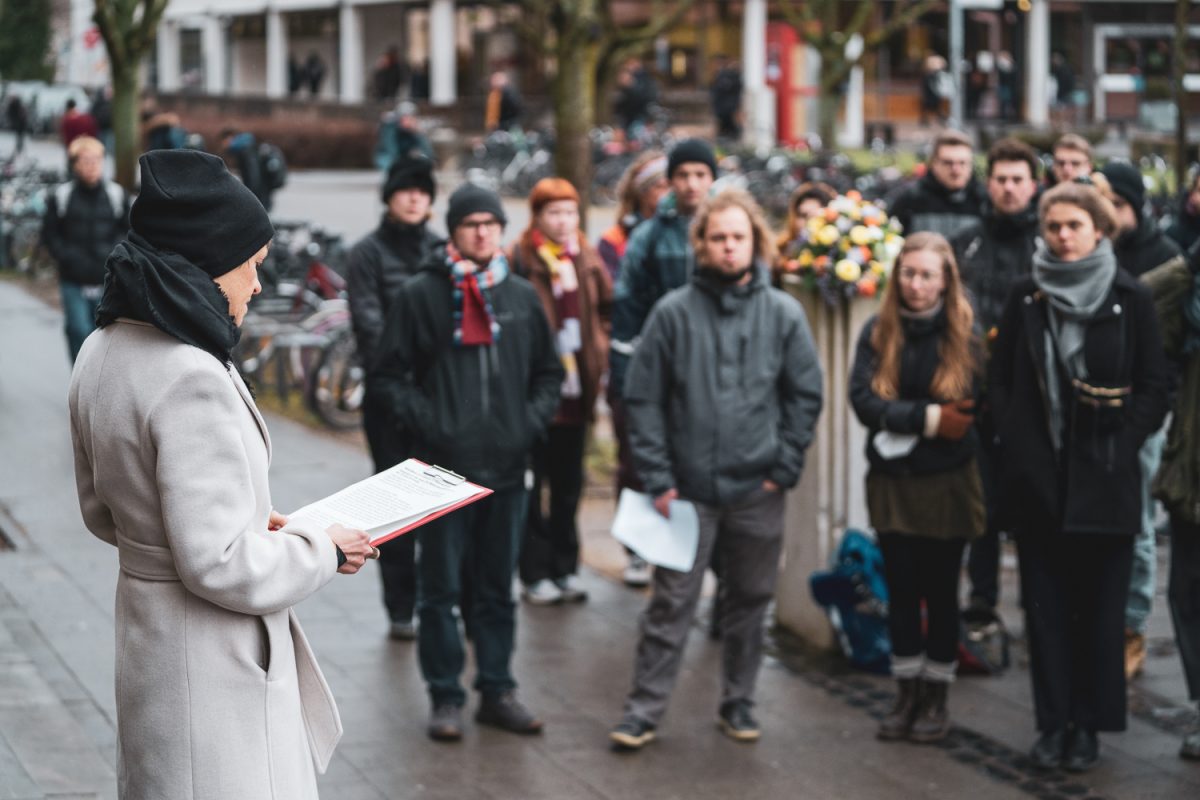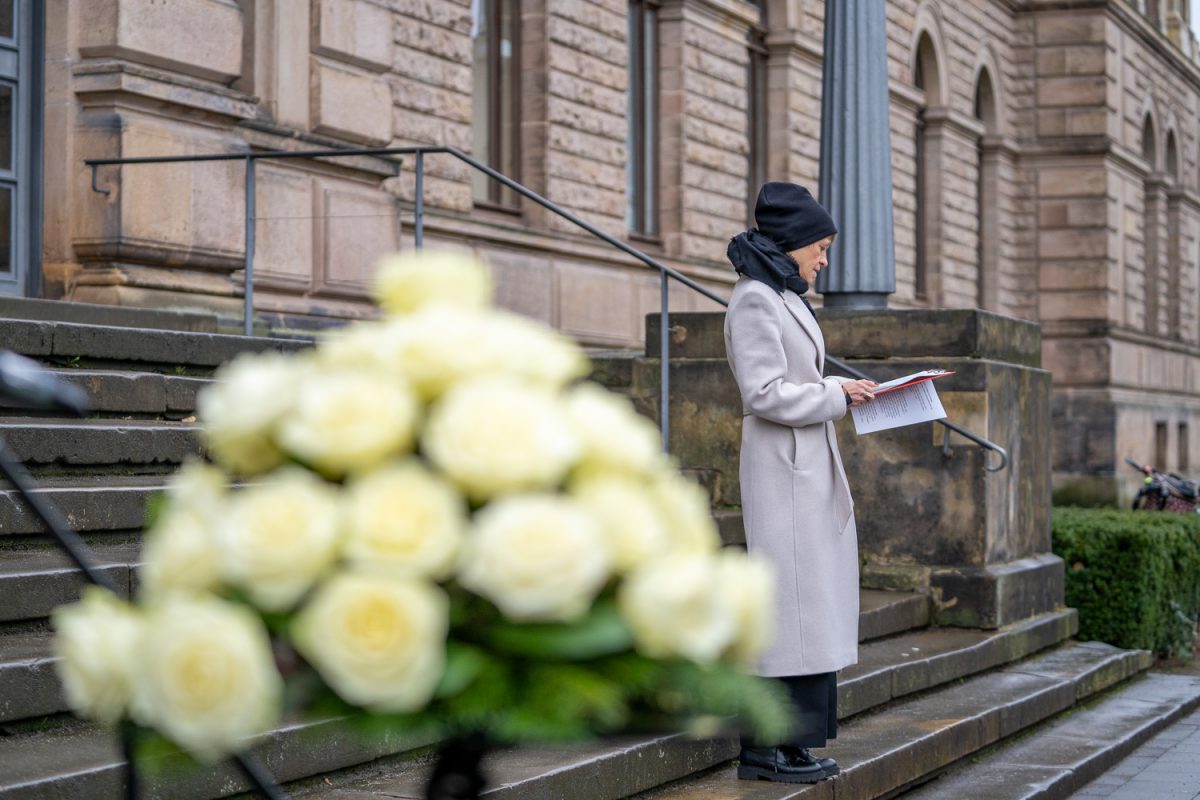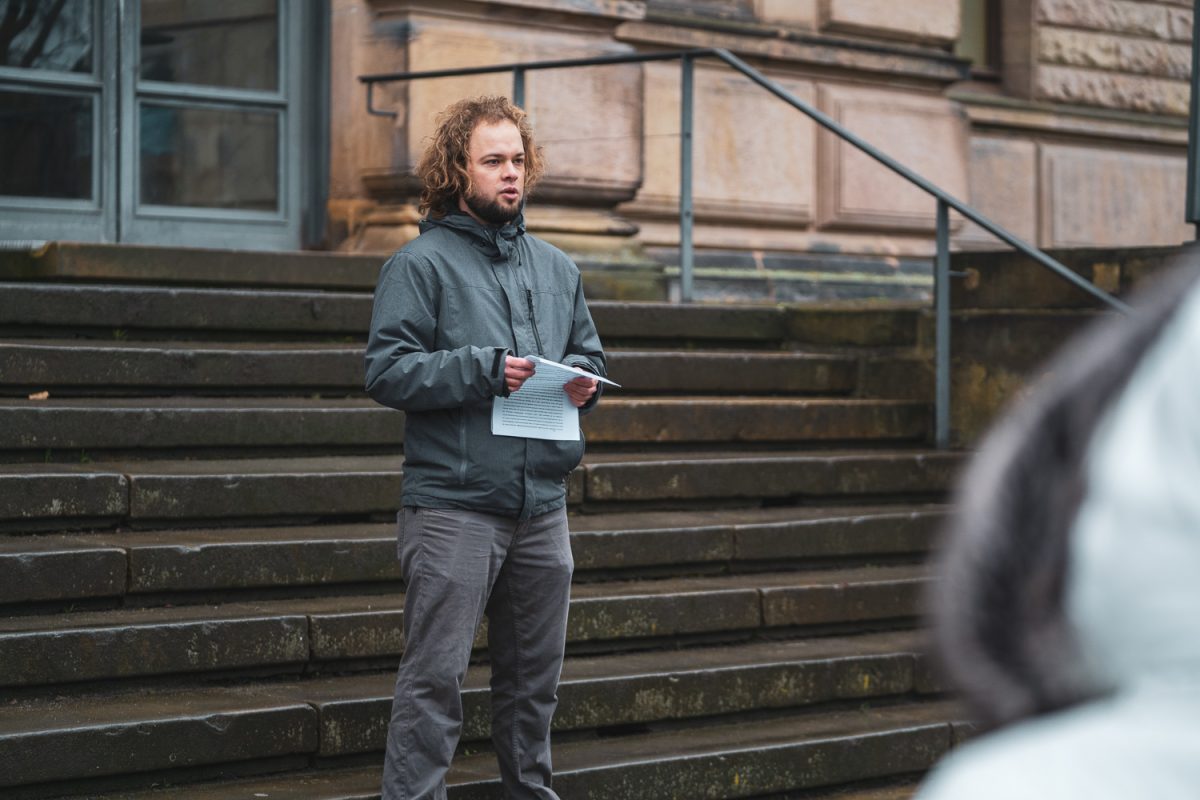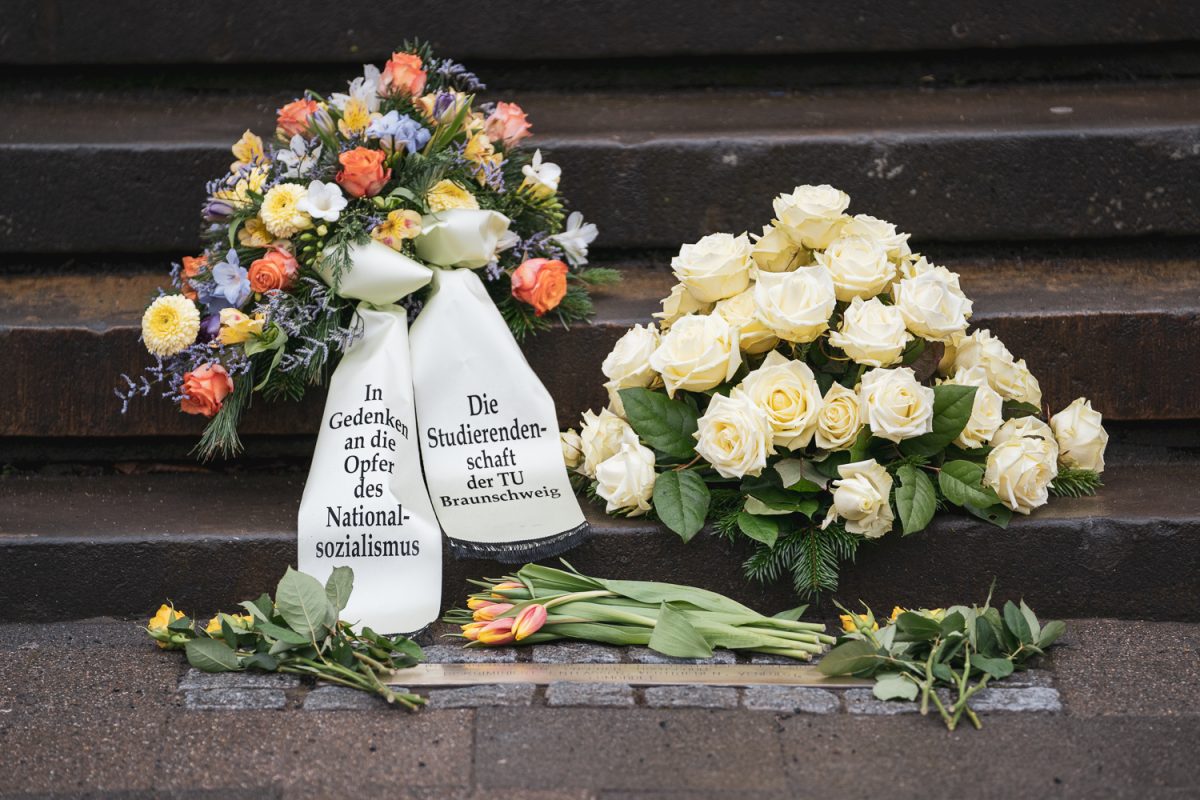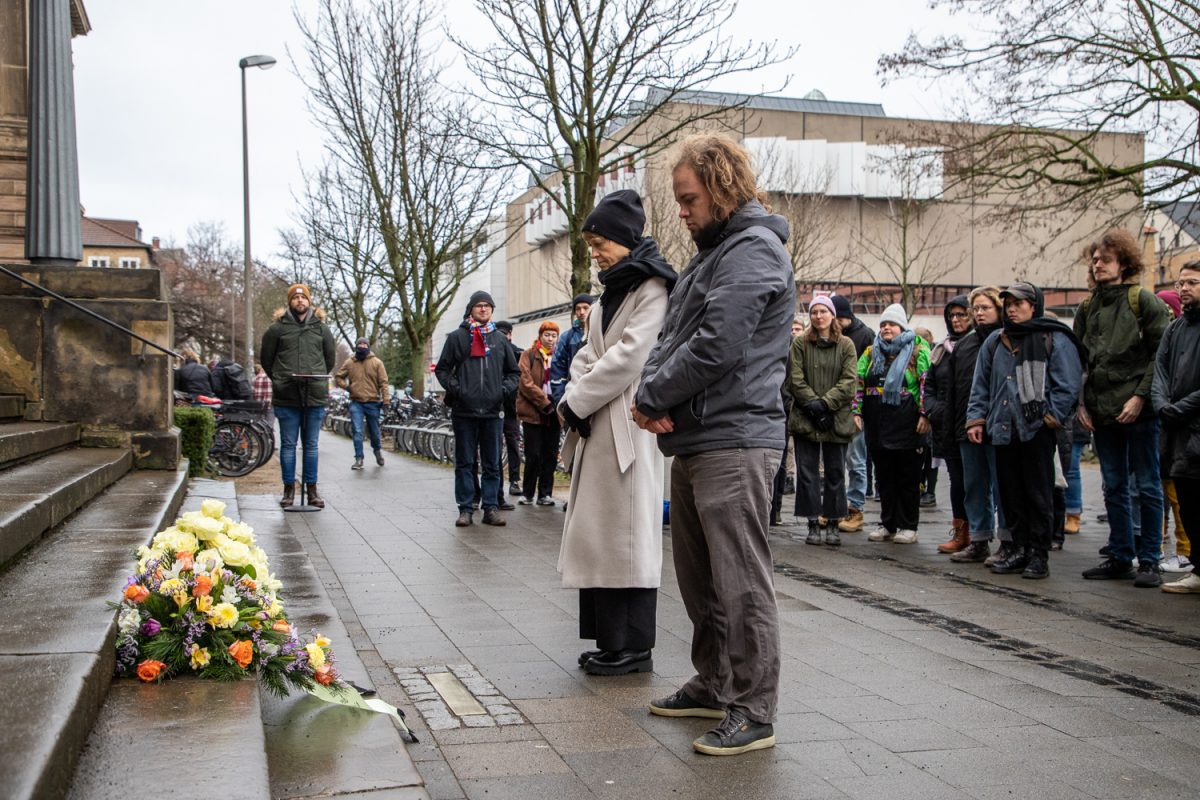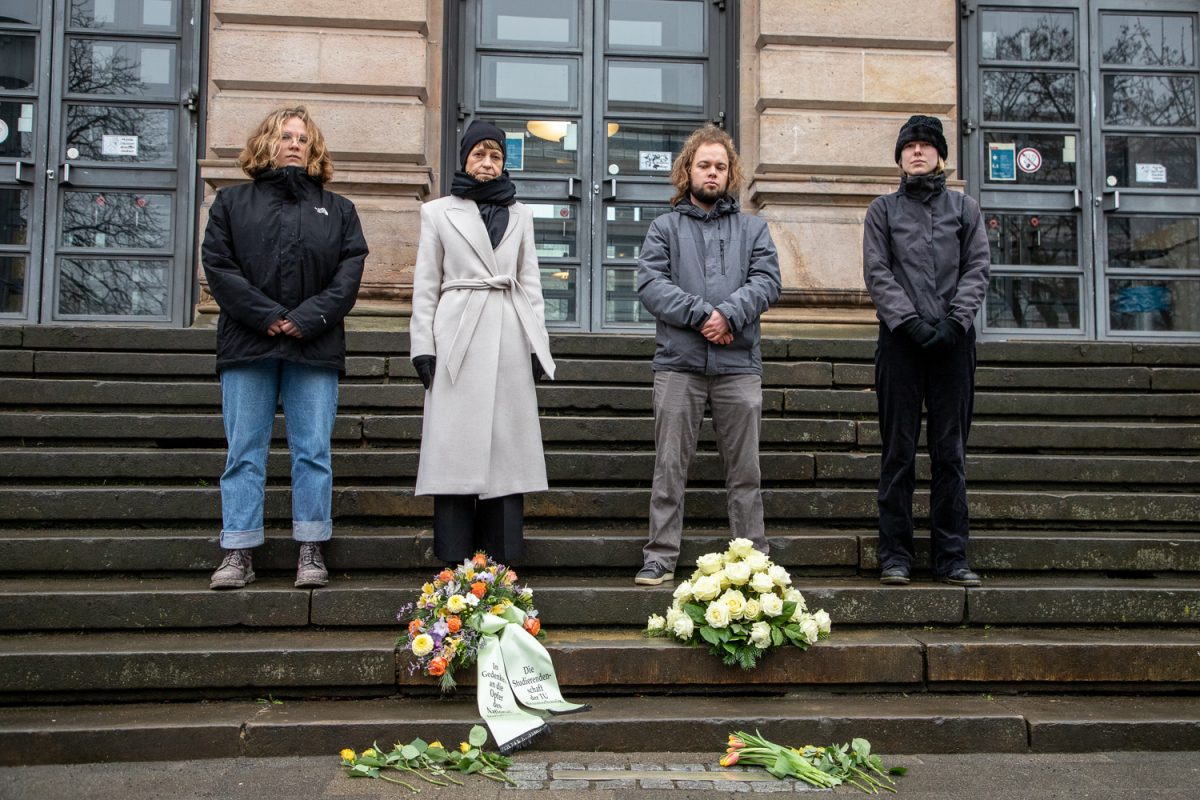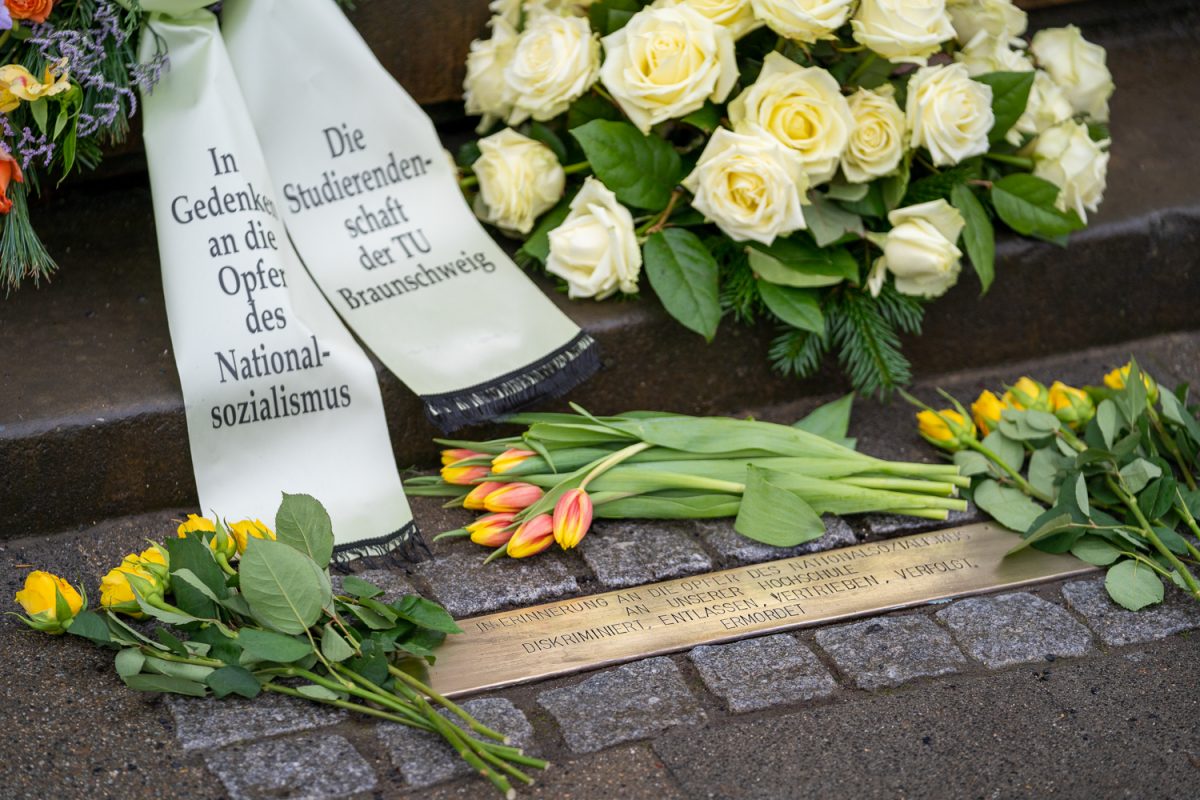Remembering and reminding indispensable TU Braunschweig commemorates the victims of National Socialism
All over the world, the victims of National Socialism are remembered on 27 January, Holocaust Memorial Day. This year too, at the invitation of the General Student Committee (AStA), a university-wide commemoration event took place at Technische Universität Braunschweig to set an example against forgetting and to remind. TU President Angela Ittel and Steffen Dohmen from the Department for Anti-Fascism and Anti-Racism of the AStA laid flowers with TU members at the Stolperschwelle (memorial stone) in front of the Historic Main Building.
In her address, the President commemorated the persecution of gays, lesbians, transsexuals and other minorities in particular this year. She emphasised that TU Braunschweig as a university is a cosmopolitan and inclusive place for all people regardless of their sexual orientation and gender affiliation.
In his speech, Steffen Dohmen pointed out that in today’s commemoration of the victims of that time, we should also remember all victims of right-wing violence after 1945, as National Socialist ideas did not simply cease to exist after 1945.
The speech of TU President Angela Ittel
“Dear members of the university, Ladies and Gentlemen, dear members of the AStA Board and the Department for Anti-Fascism and Anti-Racism of the AStA.
Dear student representatives, I gladly took up your invitation to commemorate this year’s nationwide Day of Remembrance of the Victims of National Socialism also at TU Braunschweig. With the wreath-laying ceremony on 27 January in front of the outside staircase to our Historic Main Building, we maintain the culture of remembrance of people who were discriminated against and persecuted because of their origin, religion or gender. We also remember over 50 members of our university who were expelled, dismissed or murdered by National Socialism.
Today, after so many years since the end of the Second World War, we live in a democratic society. One of the most important principles of our Basic Law (Grundgesetz) is: Human dignity is inviolable. Human rights and individual freedoms form the basis of our social order. And yet, unfortunately, we have to note that discrimination and defamation of people based on their origin or other characteristics still take place in our society.
Above all, I would like to draw the attention of all of us today to the discrimination of people on the basis of their sexual orientation or gender affiliation. Under National Socialism, they were one of the most persecuted minorities. With the tightening of the penal code in 1935, a massive persecution of homosexuals was initiated. In 1936, the “Reich Central Office for Combating Homosexuality and Abortion” was established. According to the Federal Agency for Civic Education, around 90,000 men were registered by the Gestapo at that time and 50,000 men were sentenced to prison for their homosexuality. People were persecuted, degraded, physically abused. Around 60 percent of the homosexual prisoners died as a result of mistreatment such as medical experiments.
Discrimination and persecution based on sexual orientation, nor for any other reason, have no place in our society and at our university. As long as not all people feel understood and accepted, we need to make these issues visible. I welcome the decision of the German Bundestag to make the persecution of homosexuals under National Socialism the focus of this year’s commemorative events in Parliament.
As a university, we are a cosmopolitan and inclusive place for all people, regardless of their sexual orientation and gender affiliation. Promoting diversity and equal opportunities are central cross-cutting themes in our university’s development strategy. Since last year, we have been celebrating the diversity of our university members at the annual Diversity Day. The focus theme this year is “queer-friendly TU Braunschweig”. We want to give a voice to people from the LGBTQ+ community and express our support.
I firmly believe that we as a university and as a society determine together how we want to treat and live with each other. Universities have the task to stand up against intolerance, defamation and exclusion of minorities and to live democracy. I would like to encourage all TU members to work together to shape a cosmopolitan and inclusive TU Braunschweig across all areas of our university.”
The speech by Steffen Dohmen from the Department for Anti-Fascism and Anti-Racism of the AStA
“78 years ago today, on 27 January 1945, the Auschwitz concentration camp was liberated by the Red Army. Approximately 1.1 million Jewish people, 140,000 Polish people and 23,000 Sinti and Roma were murdered in Auschwitz. Auschwitz stands like no other place for National Socialist terror and the greatest crime in human history.
Auschwitz is a memorial to where fascism, nationalism, racism and anti-Semitism lead. Or rather, it should be a memorial to it. Because today, 90 years after the handover of power to the Nazis, right-wing extremists are on the rise. They are back in the parliaments of this republic and they have long been responsible for murder and terror. Be it the pogroms of Hoyerswerda and Rostock-Lichtenhagen in the 90s or the terrorist attacks in Halle, Hanau and the NSU murders. Right-wing violence and terror have long been omnipresent again. So when we commemorate the victims of that time today, we also commemorate all victims of right-wing violence after 1945, because National Socialist ideas did not simply cease to exist after 1945. Rather, they lived and continue to live on in the minds of many people. But the revolt from politics and society remains and remained mostly absent.
Rather, leading politicians from supposedly democratic parties have ensured and continue to ensure with their statements that hatred is fuelled further and further and can penetrate deeper and deeper into society. At the same time, the state and its supposed security agencies leave those affected and victims of right-wing, racist and anti-Semitic violence alone and block the clarification of right-wing and racist incidents within their own ranks.
In the face of a state that is less and less fulfilling its responsibility, it is up to us, the civil society, to bring to life the sentence “You are not responsible for what happened. But you are responsible for it not happening again”, by Holocaust survivor Max Mannheimer.
We must therefore never stop taking to the streets against Nazis. We must never stop campaigning for the reception of refugees. We must never accept it when police and state refuse to investigate crimes within their own ranks. We must never stop raising our voices and we must never stop opposing right-wing hatred. We need an active civil society that unitedly opposes incitement and violence every day.
Today we commemorate 6 million Jewish people, 1.8 million non-Jewish Polish civilians, 5.7 million Soviet civilians, 312,000 Serbian civilians, 250,000 people with disabilities, 250,000 Sinti and Roma, thousands of members of the LGBTQ* community and the uncounted number of political opponents and resistance fighters who fell victim to the Holocaust and the Nazis’ mania for extermination. And today we remember all the victims of right-wing, racist and anti-Semitic violence in the years after 1945. Remembering the victims then and now and raising awareness of these crimes is essential, because as Holocaust survivor Primo Levi said back in 1986: ‘It has happened, and consequently it can happen again’.
Never again war! Never again fascism!”

